Buffy the Vampire Slayer: Ten Iconic Episodes
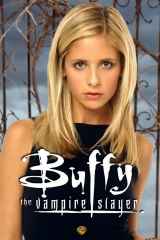 Buffy the Vampire Slayer hasn’t aired a new episode since 2003 – now, a decade on, it’s still a popular, critically acclaimed show that has staked (well, it’s not a Buffy article without puns) its claim as an important part of contemporary pop culture. Joss Whedon’s first foray into television is a brilliant, witty, genre-defying mix of monsters and myth, bad-ass action scenes, pop culture references, female empowerment, romance, family drama, incredible 90s fashion choices (let’s not forget Xander’s lurid shirts and Willow’s fluffy jumpers) and the difficulties of growing up in a small town infested with demons and vampires. To celebrate slaying, Sunnydale and (my personal favourite) Spike, I’m going to look back on ten of Buffy‘s best episodes, chosen for reasons ranging from pivotal plot moments to interesting filming or scripting choices. Choosing ten from 144 consistently good episodes was difficult, but fitting in order to celebrate over a decade passing since the finale – so without further ado, ten iconic episodes of Buffy…
Buffy the Vampire Slayer hasn’t aired a new episode since 2003 – now, a decade on, it’s still a popular, critically acclaimed show that has staked (well, it’s not a Buffy article without puns) its claim as an important part of contemporary pop culture. Joss Whedon’s first foray into television is a brilliant, witty, genre-defying mix of monsters and myth, bad-ass action scenes, pop culture references, female empowerment, romance, family drama, incredible 90s fashion choices (let’s not forget Xander’s lurid shirts and Willow’s fluffy jumpers) and the difficulties of growing up in a small town infested with demons and vampires. To celebrate slaying, Sunnydale and (my personal favourite) Spike, I’m going to look back on ten of Buffy‘s best episodes, chosen for reasons ranging from pivotal plot moments to interesting filming or scripting choices. Choosing ten from 144 consistently good episodes was difficult, but fitting in order to celebrate over a decade passing since the finale – so without further ado, ten iconic episodes of Buffy…
10. Surprise (Season 2, Episode 13)
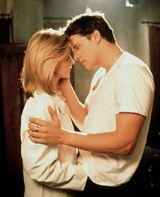
Buffy’s (Sarah Michelle Gellar) roller coaster relationship with Angel (David Boreanaz) dominated the first three seasons of Buffy and the episode Surprise depicts one of the most dramatic moments of their entanglement. There is a lot going on in this episode – the vampires Spike (James Masters) and Drusilla (Juliet Landau), previously thought to be defeated, are back with a vengeance and plan to piece together a powerful demon called The Judge (Brian Thompson); highschool teacher, techno-pagan and Giles’s (Anthony Head) love interest Jenny Calendar (Robia LaMorte) is revealed as a descendent of a group of gypsies who strive to keep Angel miserable; Willow (Alison Hannigan) finally goes on a date with Oz (Seth Green), if only to Buffy’s birthday party (note that Surprise is the first in a string of Buffy birthday episodes.) But as well as these important plot lines, Surprise portrays the first time Buffy and Angel have sex – and the more surprising consequence that comes of it. Angel, having achieved a moment of pure happiness, loses his soul and becomes the brutal killer Angelus once again. This is a turning point in the series, Angel having changed from protagonist to the main antagonist or ‘Big Bad’ – with Spike and Dru as sidekicks – and the unfolding turmoil from this moment lasts until the end of the season.
I do count myself as a Buffy/Spike fan, but this Buffy/Angel focussed episode is irresistible because of its dramatic tension, season arc significance and, of course, the wonderfully cheesy 90s-ness of the final shot where Angel walks out into the rain, has a soul-losing moment and the camera pans upwards. Most of the episodes chosen for this list happened in later seasons because Buffy‘s writers and actors only got better as time went on, but there are gems like this earlier in the show.
9. Fool For Love (Season 5, Episode 7)

Spike’s character-development is compelling: he goes from fearless killer, to chip-weakened comedic character, to a somewhat member of the Scooby gang and Dawn’s confidante, to Buffy’s well-meaning but dysfunctional lover, to a self-sacrificing hero. His changes and discoveries are fascinating and occasionally heart-wrenching to watch, but without the episode Fool For Love, which reveals Spike’s past, we would care about this character quite a lot less. At the start of the episode Buffy is almost staked by an average vampire, an unexpected brush with death that leaves her feeling vulnerable. She takes Spike, who has killed two Slayers in the past, to the Bronze and questions him in the hopes of learning more Slayer survival tactics. This makes way for multiple scenes that delve into Spike’s past, the first of which gives his character a lot of scope.
The viewer learns that, as a human, William the Bloody was a shy and bumbling poet, in many ways unlike the vampire Spike. We watch him as he is humiliated and then rejected by his beloved Cecily (Kalia Rocha – who goes on to play vengeance demon Halfrek) before getting bitten by Drusilla. The viewer also sees how he kills two Slayers, one during the Boxer Rebellion of China in 1900 and the other, Nikki Wood (April Weeden-Washington), in a New York subway during 1977, but this first scene is the most important because it shows how Spike still has human capacities – the viewer sees this through overt comparisons, for example later on in the episode Buffy remarks that he is ‘beneath’ her, accidentally echoing Cecily, and Spike briefly cries before deciding to try and kill her. He can’t even do this, though he has killed many times before – when he sees Buffy crying about her mother’s illness, all Spike can do is awkwardly comfort her. Because of the scene depicting him as human, Spike’s actions make more sense as we see how he struggles between his human and vampire sides.
This character study episode, similar to others such as Anya’s (Emma Caulfield) episode Selfless (Season 7, Episode 5) and Xander’s (Nicholas Brendon) secret show of bravery in The Zeppo (Season 3, Episode 13), reveals more about Spike’s human side and foreshadows important later events in which Spike makes noble choices.
8. Conversations With Dead People (Season 7, Episode 7)
One of the best things about Buffy is its fearless approach towards different genres and styles. Managing a balance between highschool romance, drama, monsters and comedy is impressive enough, but Whedon and his team regularly took on new angles. Conversations With Dead People is a stand-out episode because it feels fundamentally different: of course it has some of Buffy‘s almost-constants, like witty dialogue and fight scenes, but this episode is poignantly reflective and character-driven. The main creative decision that sets it apart is that none of the focus-point characters (Buffy, Jonathan (Danny Strong) and Andrew (Tom Lenk), Dawn (Michelle Tractenburg), Spike, Willow) actually converse with one another – instead, as the title hints, they all have a conversation with a dead person, during the same night.
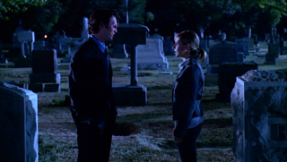
Buffy is fighting a vampire who turns out to be an old highschool classmate, Holden (Jonathan M. Woodward). The two have a long conversation about life and Holden, a psychology major just before he was bitten, ends up analysing Buffy and genuinely helping her to discover more about who she is and what she wants. The dynamic between the two, switching from fighting and comedy to thoughtful self-realisation, is a marvel to watch. Meanwhile, Dawn is visited by Joyce (Kristine Sutherland) from beyond the grave and has to battle off a haunted-house style demon before she can hear her mother’s chilling warning. Willow is visited by the recently deceased teenage girl Cassie (Azura Skye) who delivers her a fake message from Tara (Amber Benson) before revealing that she isn’t what she seems – the image of Cassie, who is actually antagonist The First, devouring herself from the inside is not easy to forget.
Jonathan and Andrew, ex-Trio nerds and prison escapees, are going through their own issues – Andrew, visited by The First’s manifestation of the dead Warren (Adam Busch), is encouraged to kill Jonathan. This is poignant because Jonathan, an antagonist who is still relatable, has a revelation about his former classmates and seems to make peace with his bad memories of high school just before dying. The last story, devoid of dialogue, follows Spike as he meets a girl in a bar and then kills her. Each plot deals with themes of loss and being alone through different styles and mediums.
Conversations With Dead People was created by four writers – Jane Espenson wrote Dawn’s storyline, Drew Goddard wrote about Jonathan and Andrew, Marti Noxon wrote the Willow and Cassie scenes and Whedon wrote about Buffy and Holden. This augments the different tones of each plot line and the sense of isolation – it isn’t surprising that it won a Hugo award for Best Dramatic Presentation, Short Form. It is comparable to the season four finale Restless where Buffy, Xander, Willow and Giles all experience surreal and frightening dreams, but Conversations With Dead People stands out as unique because of its focus on themes of loss and being alone through four separated plots.
7. Villains (Season 6, Episode 20)
One of Buffy‘s staples is the main antagonist, nicknamed the ‘Big Bad’ – in the first season this is The Master, in the third season Mayor Wilkins, in the fifth season hell god Glory etcetera. Season 2 is different because the ‘Big Bad’ is Angel, who performs a vampiric volte face after losing his soul, and this causes tensions between the protagonists when they have to fight a former friend. This idea is used again, to an even more devastating effect, at the end of the sixth season. Willow undergoes an inspiring transformation over the progression of the series, going from a shy, nerdy girl to a confident and powerful wicca. But Buffy doesn’t just leave it there – the show explores the consequences of what Willow has become during this season; the outcome of Tara leaving shows Willow how her magic use, heavily implied as similar to drug abuse (particularly in the episode Wrecked), can become dangerous.
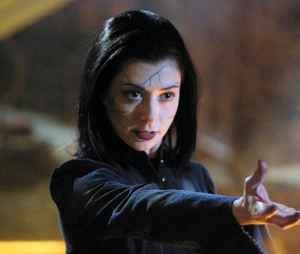
Willow tries to give up magic after almost killing Dawn and it seems things are going well; she and Tara even get back together. But, in the style of Whedon, nothing good can last: just after their reunion Tara is accidentally shot by Warren and Willow completely loses control. What results is one of the tensest ends to a plot arc of Buffy: ‘Dark Willow’ is a ruthless killer who skins Warren alive and attempts to bring about the apocalypse (though this last part isn’t as shocking to Buffy fans). Because Willow is a central and human character who is usually sensible and kind, her transformation is even more shocking and unforgettable than Angel’s into Angelus. Willow’s complete change is also not that predictable – the surprise element is partly why Season 6 went from ‘very good’ to ‘amazing’.
6. The Wish (Season 3, Episode 9)
The Wish introduces character Anya in typical Buffy style. She is a seemingly incidental character, like Jonathan or Warren, who goes on to become central. Anya is a vengeance demon who comes to Sunnydale in order to help scorned women by inflicting pain and suffering on whoever they have been jilted by. Cordelia (Charisma Carpenter) has just been cheated on by Xander, who kissed Willow in a life-or-death situation, and is being shunned by her previous group of popular friends now headed by Harmony (Mercedes McNab).

As soon as Cordelia wishes that ‘Buffy Summers had never come to Sunnydale’ Anya grants the wish. The viewer sees a Sunnydale which is controlled by The Master and other vampires, including sired versions of Willow and Xander, because there is no Slayer to stop them. There is a small defence team consisting of Giles, Oz and other students, but they don’t have the same power as Buffy and have only distantly heard of the Slayer.
The main characters who haven’t turned into vampires live in pain and fear, Angel having been reduced to a vampire toy who Willow refers to as ‘the puppy’. Cordelia realises her mistake and tries to explain the situation to Giles, but is killed by Xander and Willow. Giles does succeed in reversing the wish, but before that happens Buffy does come in to the episode, a logical and emotionless Slayer who has no reaction to the death of Angel and stakes Xander, Willow being dusted by Oz instead. The Wish shows how important Buffy is to Sunnydale by detailing how the characters would have ended up, even killing those they counted as friends in the main Buffyverse, with nobody there to stop the Master.
5. Hell’s Bells (Season 6, Episode 16)
Buffy has a wedding episode, and though is does contain some of the typical tropes – unsightly bridesmaids dresses, dysfunctional families – in the style of Buffy these tropes are played with for humorous effect and include supernatural elements. Xander proposes to Anya near the end of season five before they face Glory (Clare Kramer), and then remain engaged after they come out unscathed from the battle. During the sixth season there is a theme of doubt about the marriage but also a focus on how their love is a bastion of happiness that can weather the stormiest tragedies of Buffy’s turbulent plot line – before Xander announces their engagement Anya argues that their friends should know because it will bring them some happiness amidst difficult events and Buffy describes the wedding for Anya as like ‘a light at the end of her long, dark, nasty tunnel’.
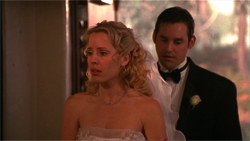
Xander does, as is wedding episode tradition, get cold feet due to a demon who poses as Future Xander, a sad old man, and shows him a nightmarish fake vision of an unhappy future with Anya. The demon, aiming to ruin Anya’s wedding because she enacted vengeance on him in the past, is eventually killed but Xander still leaves Anya at the alter; a telling shot of his arguing parents shows that Xander’s doubts about marriage are deep-rooted, the demon’s tricks only exacerbating the problem. Also, the relationship between Xander as a human and Anya as an ex-demon is highlighted during this episode, in one respect with the portrayal of family members and the mostly comic tensions between the two sides, and this theme is further explored when Anya decides to become a vengeance demon again and Xander is unsure of his allegiances when she and Buffy fight. A wedding episode with a few Buffy-esque twists, Hell’s Bells is another example of Buffy’s commitment to exploring even supernatural characters’ emotions in a moving way.
4. Superstar (Season 4, Episode 17)
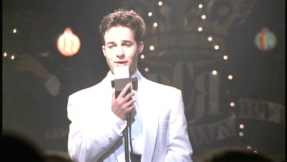
Even Buffy’s filler episodes can be very memorable, a prime example being the one where minor character Jonathan, already known by viewers for almost killing himself during Buffy’s highschool years, becomes the most popular and influential person in Sunnydale. At first no explanation is given why, then it is revealed that he has used a powerful spell – the downside of this being that he has also created a demon that is attacking people (this initial lack of clarity for viewers is reminiscent of Dawn’s abrupt introduction as Buffy’s little sister at the beginning of season five, an effective device used to pique viewers’ curiosity). Superstar is mainly a humorous episode; the other characters show a huge and unexpected amount of respect and affection towards Jonathan by reading his biography, owning his swimsuit calendar and asking for his help in any and all situations. Even Buffy thinks that Jonathan is a more skilled vanquisher of vampires and demons than she is.
Jonathan lives the stereotypical high life, owning a mansion and bedding multiple women, but eventually he cannot avoid the monster that his spell has unleashed on the world. In retrospect, this episode is a smaller-scale version of the actions of ‘The Trio’ during season six – Jonathan eventually acts against Warren and Andrew after they become dangerous in their attempts to be comic book-like villains and Warren murders his ex-girlfriend. Superstar, albeit in a comical style, foreshadows the consequences of season six where a childish scheme by three ‘nerdy’ and comedic characters actually causes a lot of real harm.
3. The Body (Season 5, Episode 16)

This episode is memorable for an obvious reason: Joyce has just died. The previous episode finished on the cliffhanger of Buffy finding her mother laying inert on the sofa, so this episode was highly anticipated – it plays on the viewer’s lack of knowledge, depicting a scene from Buffy’s imagination where Joyce is saved by paramedics before cutting back to a shot where Buffy’s mother is irrevocably dead. This event hits the viewer nearly as painfully as it does Buffy, Dawn and the rest of the Scooby gang because despite the extremely powerful antagonist Glory constantly threatening everybody and showing how endangered the characters are, Joyce simply dies of an aneurysm that most likely has nothing to do with Glory – in an earlier episode she has an operation on a tumour, and it is heavily implied that the aneurysm was due to a medical complication. A natural death in a show laden with malevolent demons and vampires who have no qualms about murder is strange and unsettling, particularly because Buffy has no power over Joyce’s natural departure. This difficulty is echoed later on in season six when Tara is accidentally killed by Warren, who has figured out that Buffy will be less powerful against a human being wielding a gun than supernatural monsters. These natural deaths hit closer to home for the characters and viewers because they are more natural types of death that could conceivably happen to anyone.

The Body has been recognized for its impact on viewers by critical recognition; Joyce Millman of Salon.com wrote near the time of the episode’s release that ‘I can’t remember the last time I saw a more wrenching portrayal of the shock of loss’ and many critics claim that The Body is one of TV’s best episodes, not just one of Buffy’s highlights. It was not nominated for any Emmy awards, despite vast critical appreciation, but was nominated for a Nebula in scriptwriting. Also noteworthy is that The Body portrayed Willow and Tara’s first on-screen kiss, a significant moment that Whedon decided to execute during this emotionally fraught episode because he didn’t want it to be a controversy gimmick, telling TV Guide that ‘It belongs somewhere where you least expect it’ – Joyce’s death effectively blanketed what could have otherwise been an episode dominated by a (at that time, to some people) controversial kiss.
2. Hush (Season 4, Episode 10)
Described by the Los Angeles Times as ‘one of TV’s most terrifying hours’, Hush is a genuinely scary episode of Buffy. There are other creepy characters, for example the Der Kindestod demon in Killed by Death (Season 2 Episode 18) and the skin-slicing Gnarl from Same Time, Same Place (Season 7, Episode 3), but The Gentlemen, strange fairytale creatures who survive on human hearts and come with their own chilling rhyme, take creepiness to new heights. Without the element of silence the episode would not have been nearly as frightening – the whole town of Sunnydale becomes speechless after The Gentlemen capture their voices, because human screams are the only thing that can kill them. The incident is reported on the news as a freak case of laryngitis so the town is shut off from the rest of the world; Sunnydale is left silent and alone at the mercy of seven nightmarish men and their deranged, straitjacketed servants.
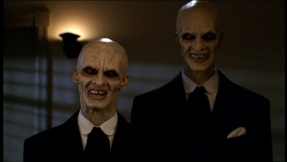
The residents of Sunnydale react as any human would with a sudden lack of communication: they become confused, reserved and depressed. As a viewer I also found the lack of speech disquieting, because Buffy usually relies heavily on dialogue. However, it was interesting to see how the characters handled the situation with gestures and body language, a key theme of the episode being the ability to express feelings – for example Buffy and Riley are able to kiss whilst speechless, whereas earlier in the episode they keep talking instead. Also, this episode introduces Tara, a shy young woman with magical ability who is silenced by louder voices during a college Wiccan meeting that Willow also attends. Tara is chased by The Gentlemen and helps Willow to move a vending machine via telekinesis, at this point able to express herself despite having no voice. Whedon, on the episode’s DVD commentary, says that ‘when people stop talking, they start communicating. Language can interfere with communication because language limits.’ So despite its despairing tones, this episode also shows the strength of human beings in the face of seemingly invincible foes – a theme integral to Buffy, which later deals with super-monster Adam, powerful hell god Glory and The First.
Hush is the only episode of Buffy that was nominated for an Emmy for Outstanding Writing in a Drama Series and it was also nominated for the Outstanding Cinematography for a Single Camera Series Emmy. Personally I think it should have won both – even now Hush stands out in many fans’ and critics’ minds as an essentially important Buffy episode, its unsettling and empowering images imprinted indelibly onto the mind of Western pop culture.
1. Once More With Feeling (Season 6, Episode 7)
As soon as I started watching Buffy (admittedly not too long ago) my friends who were already fans kept saying ‘just wait until the musical episode!’ A musical episode, in Buffy? I was used to the show’s experimental genre mixing, but this was a whole new step into the weird and wonderful. After five and a half seasons of waiting, I was very excited to watch Once More With Feeling.
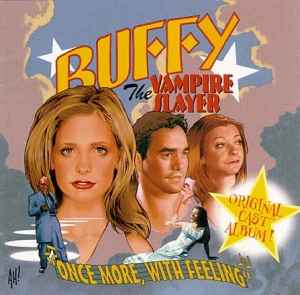
The premise is similar to plenty of other Buffy episodes – a new spell/monster/power, this time in the form of a dapper demon called Sweet, comes into Sunnydale and messes around with the (very fragile) normal order. But this episode is special because the musical elements take the forefront, revealing profound truths about characters’ thoughts and feelings. The song ‘I’ll Never Tell’, a duet between Xander and Anya about their impending marriage and accompanying doubts, was a highlight because of its humorous lyrics and fast pace – a later musical excerpt in Season 7 Episode 5 (Selfless), where Anya sings about becoming ‘Mrs. Harris’ and the scene is suddenly cut-off by a silent shot of Anya impaled by a sword, has a huge impact on the viewer due to this episode. However, the repeated motif that culminates at the end of Buffy and then Spike’s song ‘Life’s A Show/Give Me Something To Sing About’ really steals the show with its foreboding and wistful focus on Buffy’s revelation that she was resurrected from heaven.
Once More With Feeling has received vast critical acclaim and was nominated for an Emmy for Outstanding Musical Direction, a Hugo award for Best Dramatic Representation and a Nebula award for Best Script. There were even Rocky Horror Picture Show style sing-along events, presented in theatres where the audience would dress up as characters and shout out scripted lines, until a financial dispute caused Fox to stop them. It was strange to watch this quirky episode in the middle of an intense season that dealt with Buffy’s inability to enjoy living, but the high quality of its choreographical, musical and lyrical elements meant that Whedon and his talented cast managed to pull off a difficult mix of musical, horror, humour and drama.
What do you think? Leave a comment.











This is now my favorite Buffy list, but because your list is similar to mine, which it’s not, but because I loved reading your criteria!
Personally, I like to divide my Buffy list into favorite seasons.
My favorite would have to be season 2. Angelus is one of the greatest villains in the history of television. What he did to Jenny in Amends was just so disturbing, and that moment where he tortures Giles is chilling. “I want to torture you, its been so long since I tortured someone, last time they didn’t even have chainsaws”.
Second would be season 3. Everybody I think loves season 3, the Mayor and Faith are excellent pairing.
Third would be either a toss up between 5 and 4. I loved the individual episodes in 4. Spike was at his best in season 4, as the funny guy who made fun of them and betrayed them. I much preferred the sarky, witty, self serving season 4 version of spike to the later sissy, always getting beaten up, tortured, crying about Buffy version.
However I think season 5 had a better story arc.
However season 4 had Riley and Season 5 had Dawn, both points against them LOL.
Season 1 would be fifth. It is not quite as good as some of the others. It has a strong story arc, the Master is a good villain, and it has I think the best opening to any season. Welcome to the Hellmouth and The Harvest are excellent first episodes to any series. Prophecy girl is also one of the best finale’s. Its the standalone’s that let it down.
Season 7 has a couple of nice ideas and is quite a good ending to the show, but its much weaker overall than most seasons.
Season 6 is my least favorite series. It has too much soap opera. The great thing about Buffy was that it balanced out both the soap opera elements and the fantasy. In series 6 however I think the fantasy takes a back seat and its duller than the others. Its still a good season though, but if I had to have one come last it would be this one.
My order:
I love season 6. It might be my favorite season.
Objectively, I think 5 is stronger (which I put in a very close second place – depending on my mood it can flip-flop with S6 for the top).
I really like S4 despite its weaknesses – it’s a fun season.
7 has some missteps and pacing problems, but there’s a lot in there that I like too. It’s probably tied with S4…?
Season 2 has some great highs, but some low lows. I find it very uneven. Still, Passion is the first great episode of the series, IMO, and the Angelus stuff is good. Plus, we meet Spike, who was a massive step up in villainy from The Master and The Annoying One.
Season 3 is objectively quite good, and I do like Faith and the Mayor, but somehow it’s just not super-duper compelling as a whole to me? I don’t even know if I can explain it or pinpoint it, but it’s just not among my favorite seasons. I feel like I’m into when I watch it, but when it’s behind me there’s not a lot that’s terribly memorable to me personally. So lack of a long-term impression, maybe? 2 and 3 might be about a tie – S3 is more consistent, but S2 has better high points.
I only appreciated S1 after watching the whole series. The first time through it was… just ok. Now there’s a nostalgia factor and everyone is baby-faced and knowing where they end up, it’s kind of fun. But still my least favorite season for its straightforward simplicity.
Hey Twenty Eagle, thanks for such a great comment! Seasons Two & Three are both totally solid, I really enjoyed the overall plots, but I think that on an episodic basis the later seasons had some great examples – I think if I made a season ranking list things would have ended up very differently! As for which season I would put where, I have to ponder on that.
I totally agree with your analysis of 6 – I got fairly frustrated with it until the final episodes, ‘dark’ Willow is definitely one of my favourite baddies! Also, Tara is one of my favourite characters so the season 6 finale was very emotional on that count.
I want to watch Buffy all over again now 😀
And Paula – thank you! I think that because Buffy always tries out something new there are differing levels of just about everything in each season – and makes for some interesting fan rankings! Also agreed – I love watching old episodes in hindsight, they’re all so young :’)
When I first started watching the show a few years ago, I probably would have ranked the seasons:
2, 4, 3, 5, 7, 1, 6
But now I would rank them:
4, 7, 1, 2, 3, 6, 5
As you can see, Seasons 1 and 7 moved far up the list, Season 2 dropped down below them (giving 4 the top spot), and Season 5 dropped to last place.
My reasoning:
Season 7 is very different from the other seasons and has some pretty obvious flaws, so I can certainly understand why a lot of people don’t like it. I, however, absolutely love every single episode if it, other than Empty Places (of course). I enjoy this season more each time I watch it.
Season 2, despite having a great overall arc, more than half the season is comprised of terrible standalone episodes, making it hard to rewatch. Season 1 is also mostly standalone episodes, but they are so wonderfully cheesy that I just love rewatching them. What a fun season.
Season 3 has some amazing episodes, but I find Faith kind of annoying and the overall arc isn’t that interesting. Season 6 is mostly bad, but it has some fantastic episodes and twists.
Season 5 is just so blah. It has three good episodes (Fool for Love, The Body, and The Gift) and that’s it, the rest are completely forgettable. Dawn is annoying as hell, Glory is kind of lame, and it’s all just not very fun. At first I thought this season was pretty intense (“Holy crap, Buffy’s fighting a god!”) but now I just find it incredibly boring.
As for Season 4 being my favourite… well:
Season 4:
– So many amazing episodes: Hush, Restless, Who Are You?, The Initiative, Fear Itself, The Yoko Factor, Something Blue, Wild at Heart, Primeval
– Great transition from high school years to adulthood; realistic portrayal of how friends can sort of drift apart in the first year of college
– Perhaps a weak overall plot with the Initiative and Adam as a villain, but the real focus of the season was always the characters, and in that respect, I find it very successful
– Introduction of Tara and her relationship with Willow, which was handled quite beautifully in this season.
I love your reflection and reasoning 😀 and 4 is such a good season! High school TV often has that ‘boxed in’ feeling because of the surity that yes, the characters will be there for 3 years, but I found the elements of doubt and uncertainty in later seasons much more appealing (likely because I’m now a uni student but in my final year!)
Season 2 – Best season of anything ever tied with Angel season 5 and Breaking Bad.
Season 3 – Great season and The mayor was a great villain.
Season 1 – A few episodes were abit stupid but I still love it.
Season 4 – Not as good as the first 3 seasons but it did have Tara and Spike was funny this season.
Season 6 – The only reason I put this so high is because of Tara, some great episodes and an amazing finale.
Season 5 – Would be higher but I don’t like Glory or her storyline. I loved Tara this season but it was so sad when she got brain sucked.
Season 7 – Was a good season but I missed Tara she should have lived and Willow should have died. Caleb was an awesome villain.
Buffy: “I know that you probably don’t approve, and my father’s not that far away, but this day is about my real family. I’d like for you to be the one to give me away.”
That line takes me away. Great article!
Giles = best substitute father ever :’) thanks chapdelaine!
Love this article! A big fan of the show. Probably one of the best shows on TV back then. I also love the finale of season 5 where Buffy whispers to Dawn “The hardest thing in this world is to live in it…”.
Again, loved reading this. Thanks for bringing back great memories.
Cheers for the comment SilverKiss 😀 ain’t nothing like a good bit of nostalgia!
Im a huge fan of David Fury episodes which consists of a stable of Buffy and the later seasons of Angel. His work ranged from the banally campy (Go Fish) to hilarious (Fear, Itself) to the deliciously dark (Helpless, Grave). The only episode of his I truly disliked was Lies My Parents Told Me, but I can forgive him on the fact that everyone by that point of the show was on full auto-drive mode. Still, turning Giles into a quasi villain was a pretty unconscionable decision.
I might even like him better on Angel. He started slow but his tear of episodes from mid-S4 and beyond rival that of any other writer in the Buffyverse. He wrote some of my absolute favorite episodes from that show, I can’t say the same for Buffy — with the notable exception of Fear, Itself.
I didn’t pay too much attention to who wrote what whilst watching, I think that when I watch again I’ll be looking out for it 😀 David Fury did write some greats!
Okay, my turn.
Season one: Angel
Season two: Passion
Season three: Band Candy/Lover’s Walk (tie)
Season four: Hush/Something Blue
Season five: Fool for Love/Crush/The Body
Season six: Smashed/Dead Things/Entropy/After life (for the look on Spike’s
face as he sees Buffy for the first time.)
Season seven: Beneath you (for Spike’s confession)/Conversations with Dead
People/Lies my parents told me/Touched (for Spike’s speech)
There’s probably some unconventional ones up there, but then I’m unconventional.
Yep, there’s a lot of episodes there I love 😀 Band Candy and Something Blue were so nearly in my list! I also absolutely love the episode Doppelgangerland.
This show had some great villains didn’t it. Remember those three funny, pathetic little guys that turned into criminals and murderers (or at least one of them). They were the most “real” of all the villains and that’s what made them so effective; Warren as the guy who never ever learns a life lesson and ends up committing half unintentional but horrible crimes, Andrew as the follower, and Jonathan as the one who even wasn’t that evil but couldn’t predict the consequences of his actions.
Magic, monsters and metaphors are all good, but when you stick a normal human being with a gun in the middle or all that, it cuts to the bone.
Time to rewatch the show for the forth time 😉
Yes, that’s what made Season 6 so good – at first I was a little frustrated because I didn’t know where it was going, but the final episodes were just explosive.
Also, I salute you for having watched 3 times already!
Spot on list, in fact, it’s made me want to watch it all over again!
Thanks Sophie 😀
Two things stood out in the article for me: the writer had come late to the party, and thought that the writing and acting kept getting better. Yet another new fan who prefers the later seasons.
Some of my favourite episodes are:
1. Once More, With Feeling
2. Hush
3. Chosen
4. Tabula Rasa
5. Grave
6. The Body
7. Sleeper
8. Innocence
9. Passion
10. Something Blue
11. Amends
12. Intervention
13. Fool For Love
14. Seeing Red
15. Becoming part 2
16. Conversations With Dead People
17. End Of Days
18. Restless
19. The Initiative
20. Touched
I rewatched The Prom recently. That’s one of my favorite episodes, not only for the Class Protector award but for Xander being a really nice guy for getting Cordelia’s dress out of layaway but mainly for him not making fun of her or telling everyone else about it; nice to see that he could be mature when it counted. And I loved that the other students acknowledged that Sunnydale wasn’t exactly the most normal place on Earth!!
Like others, I’d definitely be substituting some of the later season’s eps for eps from S2 & 3. Earshot, for instance, would be in there for me. Conversations with Dead People is one of the best ever though. My list would be as follows:
10. I was Made to Love You (S5, E15)
9. Once More, with Feeling (S6, E7)
8. Who Are You (S4, E16)
7. Earshot (S3, E18)
6. Restless (S4, E22)
5. Prophecy Girl (S1, E12)
4. Bewitched, Bothered & Bewildered (S2, E16)
3. Conversations with Dead People (S7, E7)
2. Passion (S2, E17)
1. Hush (S4, E10)
Honourable mentions go to: The Zeppo (S3, E13), Halloween (S2, E6), Superstar (S4, E17) and Showtime (S7, E11).
Nice list, really enjoyed reading it. I do like a bit of Buffy but can’t claim to be as big a fan as all you other posters. I usually watched it because it had a really good opening theme song but also because I was pretty young and it happened to be on straight after the Simpsons on BBC 2 (specific British schedule reference). However, I do now know this. Joss Whedon makes really, really, really good TV.
This is my kind of thread! But where’s the love for Restless!! I’ve always put the brilliant Season 4 finale up there with “event” episodes like Hush, The Body, and Once More With Feeling (probably no coincidence that these are all Joss Whedon eps). It’s masterful in the way that it weaves together everything that had come to pass thus far while teasing and foreshadowing the major developments to come, not to mention emphatically slamming the door on Riley and the lame initiative arc. As a pure stylistic exercise, the highly symbolic dream episode rivals the best the show had to offer, and (in pure Buffy fashion) it’s completely character and relationship-driven.
Hi Brett – Restless almost got into this list, it’s definitely in my ‘top 15’, but I wanted to get a variety in this article and I find that Restless and Conversations with Dead People have some similar themes/ideas/style choices and the latter has received more critical recognition. But I appreciate your point – it’s an amazing episode!
The only thing I would change is the not having Passion on your list simply because it is such a hauntingly beautiful episode. The metaphor of passion as a beast is amazing. Other than that I enjoy the episodes you have chosen and completely understand your trouble in having chosen just ten!
This was such a great, nostalgic read! I’ve now decided to re-watch the entire program again. ‘The Wish’ will always have a special place in my heart, for its sheer grown-up darkness (heralding a new maturity in the show) and for the introduction of Anya(nka) of course! I don’t think there are enough strong female characters with real, complicated relationships on TV – not just ‘best friend’ and ‘future/willshewon’tshe boyfriend’. I’m still waiting for something that I can love and respect as much as this show.
This makes me want to go and rewatch Buffy again! Thanks for a great list and interesting perspectives on some of my favorite episodes!
“Once More With Feeling” and “The Body” are to this day some of the best episodes of television I am ever watched. Ever. I have never seen a musical episode at nearly the same level as OMWF, and I physically cannot watch The Body is one sitting without going to hug my mother at some point.
Awesome list! I definitely agree with the top three.
Many have identified the episode, “The body,” as one of the more powerful of the Buffy canon, yet despite its beautiful moments of powerful acting, I thought the episode left too many unanswered questions such as: how did Mrs. Summers exactly die? and Did her death have anything to do with the dates she had been on recently?
Quite a bit has happened to the creator of this show nearly a decade from this article’s publication.